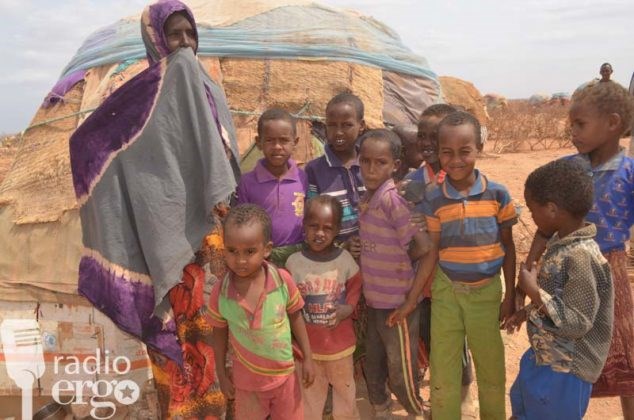
Friday February 10, 2023

Photo//RadioErgo
(ERGO) – Asha Mohamud Abdi migrated with her eight children and her last 16 scrawny goats from their village in the rural area in northern Somalia’s Sanag region to the coastal town of Elayo in January, hoping that being nearer the town increased her chances of getting help.
Although she dearly holds on to her goats, they barely produce any milk and do not meet standards for selling in the market. They are the sad remainder of her former herd of 250 goats that has been decimated by the ongoing drought.
However, since reaching Elayo, on the eastern side of Sanag near the border with Bari region, they have received no aid in the shabby camp where they are living. She was handed some food collected by local people when she first arrived, but that lasted barely a week.
“Only God knows the situation in the camp, we are just here because we don’t know where else we can go. We are all facing a dire situation and we are vulnerable, we desperately need help,” Asha told Radio Ergo.
Asha, a widow, is taking food on credit from a local shop to feed her young children, although she is worried that it will not be possible for her to pay her debts.
Asha’s family is among 200 such families who have moved to the camp on the outskirts of Elayo town from the desiccated rural pastoralist villages around.
“When the drought became prolonged, water became very scarce. Then our goats started dying due to thirst and diseases. The people stopped slaughtering the livestock because they were spreading disease to the people, and it’s at that point we moved to the town,” Asha explained.
Long walk for water
Mohamud Said also moved to Elayo in December 2022 after losing 70 goats to the drought. He and his family of 11 are still struggling to find water and food.
Trucks bring water to the camp, selling a 20-litre jerrycan of water for the huge price of $10. As he cannot afford such prices, Mohamud and his children walk for about 10 kilometres a day to fetch free water from a well, carrying it back with them.
Some of the pastoralist men like Mohamud have turned their hand for the first time to fishing in the ocean. He and his family now eat the fish when he makes a catch. He also takes food on credit from local shops.
Abdullahi Hassan and his wife and seven children live in small shack in the camp outside Elayo, where they also arrived in December, after losing all his 300 goats and 15 camels.
He hoped they would receive aid in the camp, but nothing has arrived for them and they remain in a desperate situation. His family also walk to fetch water from the nearest, well although he says his children have fallen sick after drinking it.
“We are impoverished people!,” Abdullahi said.
“We are not receiving even water or basic health services. We need aid intervention.”